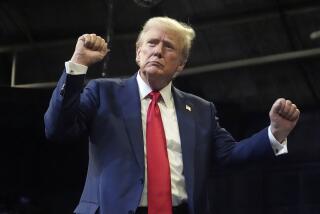Op-Ed: How fear makes Americans susceptible to Trump’s magical thinking

- Share via
On Monday night, President Trump told the nation that he could stop the unrest from nationwide protests and restore security in America: “We will succeed 100%. We will succeed. Our country always wins.”
Two weeks ago, he told the press he was taking hydroxychloroquine to ward off COVID-19. “I take it because I think I hear very good things,” he said. “I want the people of this nation to feel good. I don’t want them being sick.” So what if clinical tests have found the drug carried risks for coronavirus patients, with no benefits?
Trump’s comments in these two instances and many others during his time in office are indicative of his magical thinking.
Magical thinkers are impatient and go with their gut. And in the early days of the pandemic, Trump happily declared that the coronavirus would just disappear like miracle one day.
“Magical thinking” is a phenomenon long studied by psychologists and anthropologists. It refers to the belief that one can have an impact on events simply by thinking in a certain way or following a certain ritual. One’s wishes simply become reality — a way of thinking not uncommon in young children. Sometimes, called a “pre-operational” stage of cognition, it is characterized by pretending rather than using information, by a reluctance to consider the points of view of other people, and by a lack of logical reasoning.
Magical thinking persists in some adults because, occasionally, it works. Placebos, too, can be surprisingly effective. And positive thinking can produce positive results in various dimensions of our lives.
When people feel helpless, or when they are under a great deal of strain, magical thinking can create a sense of control and restore confidence. But ignoring reality and closing oneself off from the viewpoints of others to build self-assurance in the face of adversity is often associated with narcissism. For narcissists, the border between wishes and reality is fuzzy, and part of their self-aggrandizing tendencies is to believe that whatever they want to happen will happen.
It rarely works out well to simply assume that the world will conform to one’s wishes, and in times of crisis, it can be disastrous. It might lead you to demand that governors open churches “right now,” as Trump said recently, because he knows faith leaders “quite well” and understands that they “don’t want anything bad to happen” to their people.
Although this was surely an attempt to rally a political base of religious believers, it also exemplifies Trump’s view that his very commitment to an idea makes the idea real. As long as the commitment is intense, the narcissist believes things will work out. Freud pointed out long ago that this substitution of intensity for reality is the remnant of an infantile stage of development in which the person is “only affected by what is thought with intensity and pictured with emotion, whereas agreement with external reality is a matter of no importance.”
Education in general and science in particular are antidotes to narcissistic overconfidence. I see this regularly as a professor at and president of Wesleyan University. Students often arrive thinking they already know how to be successful in a school setting. They quickly discover that even when they work really hard, there is always more to do. Getting really good in a field you care about takes more than confidence and wishful thinking.
Every discovery in science is accompanied by the opening of new questions, and a liberal education helps students gauge the depths of their ignorance while giving them the skills to create and test solutions to problems in the world. Educators don’t promise to reveal the truth, but they do promise to expose errors and create new areas of inquiry.
Students and teachers recognize that nobody has all the answers and that good questions are the ones that lead to more investigations. The best teachers retain a sense of intellectual humility. One thing Anthony Fauci, director of the National Institute of Allergy and Infectious Diseases, knows for certain is that he doesn’t know everything.
Hence the tension between the president’s magical thinking and the advice he is getting from his scientific advisors. They must see the danger posed by Trump’s wishful thinking during this deadly public health crisis.
Now in giving angry, fearful advice to governors — “if you don’t dominate, you’re wasting your time” — Trump falls back on magical thinking when confronted by domestic unrest he doesn’t understand.
A crisis is exactly the time when people are scared and confused. Unfortunately, it’s at such times that anti-intellectualism and magical thinking offer consolations to those afraid of what they don’t know.
Michael S. Roth is president of Wesleyan University. His most recent book is “Safe Enough Spaces: A Pragmatist’s Approach to Inclusion, Free Speech, and Political Correctness on College Campuses.”
More to Read
A cure for the common opinion
Get thought-provoking perspectives with our weekly newsletter.
You may occasionally receive promotional content from the Los Angeles Times.










